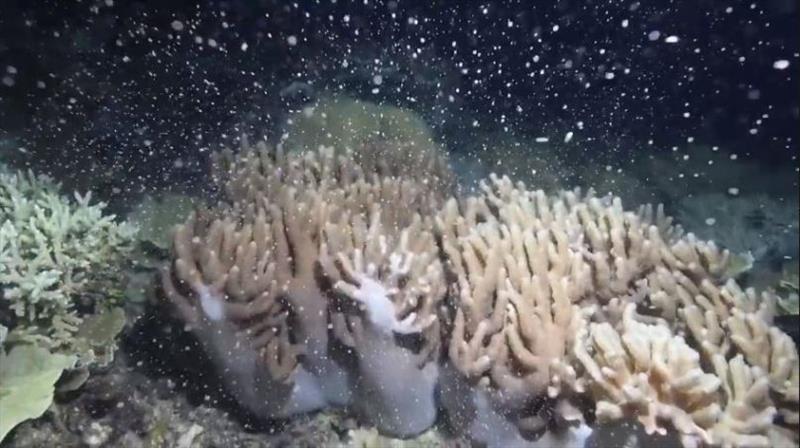
Spawning time: Coral reproduction
by GBRMPA 7 Dec 2020 02:07 GMT

Coral spawning time © GBRMPA
Most corals are hermaphrodites as they produce both male and female reproductive cells (known as gametes).
Corals can reproduce in many ways:
- Spawning involves eggs and sperm being released into the water column simultaneously.
- Brooding occurs when spawned sperm fertilises the eggs within the polyps. The larvae are then released into the water when they are relatively well developed.
- Budding is where a young coral grows out from the adult polyp.
- Parthenogenesis involves embryos growing without fertilisation.
- Coral bail out occurs when a single coral polyp splits from an adult polyp before drifting off and settling elsewhere. As the new polyp grows, it forms its body parts.
All asexual reproduction — budding, parthenogenesis and coral bail out — result in clones being formed.
Mass coral spawning
One of the most spectacular events to occur on the Great Barrier Reef is the annual synchronised spawning of corals.
This mass reproduction only happens once a year. It involves colonies and species of coral polyps simultaneously releasing tiny egg and sperm bundles from their gut cavity into the water.
By expelling the eggs and sperm at the same time, the coral increases the likelihood that fertilisation will take place.
The mass spawning occurs after a full moon and only after rising water temperatures have stimulated the maturation of the gametes within the adult coral. The day length, tide height and salinity levels also appear to be factors in deciding when the event will happen.
The spawning lasts between a few days and a week. This is because different species release their eggs and sperm on different days to prevent hybrids from being produced.
The phenomenon — which only happens at night — resembles an underwater snowstorm. But rather than being all white, there are also clouds of red, yellow and orange. All the bundles rise slowly to the surface where the process of fertilisation begins.
While spawning takes place on a large scale, it doesn't happen across the entire Reef all at once.
Instead, the time of year that corals spawn depends on their location. Those on inshore reefs usually start spawning one to six nights after the first full moon in October, whereas those in outer reefs spawn during November or December.
When an egg is fertilised by a sperm it develops into coral larva called a planula that floats around in the water for several days or weeks before settling on the ocean floor. After the planula has settled in a particular area it starts to bud and the coral colony develops.
The mass spawning also provides ready food for other marine creatures, particularly nocturnal animals such as plankton and some fish species.